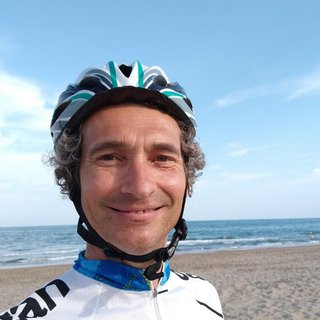When treatment causes difficult side effects
Andy, diagnosed with CML in 2011, describes how getting side effects taught him the importance of educating yourself on your treatment options, and not to be afraid of asking your clinicians for alternatives.

When I was first diagnosed, I was like a rabbit in the headlights. I was in shock, so I accepted what was being said to me.
Everything that was explained to me about my diagnosis and what medications I’d be on was a complete blur at the time. I agreed to take part in a clinical trial but didn’t look much into the drugs I was put on.
That was 10 years ago. Things are a lot different now but the lesson I learnt still applies. Communication around medications is clearer, the information is better and our general understanding of the treatments is much more comprehensive.
With the benefit of hindsight, I was probably quite naïve as I didn’t take responsibility for what medication I was on until I ended up in hospital in 2016 having experienced severe side effects.
I was then given a choice of treatments, and I realised how much I could be educating myself about what each treatment would do to my body, so I could make an informed decision about my own care in conjunction with my consultant. I want you to know that you can do that too.
I studied the information that cancer charities provided, I spoke to a Macmillan nurse, and I read through medical information from reliable sources to inform myself before I decided on my treatment. This gave me the confidence and background understanding to have a detailed and meaningful discussion with my haematology consultant.
I realised how important it was to take the side effects information seriously, now that I had experienced some of them myself.
Consider your quality of life
The initial medication I was on was great at controlling the leukaemia. However, it wasn’t a sustainable option for me in the long-term because of the side effects. There were other drugs I could try so I prioritised my overall well-being and I decided to change treatment. I wanted to function as well as possible and if I continued on the previous medication I thought it was almost certain that the side effects would recur. This was also the opinion of the respiratory consultant that had treated me in hospital.
The drug I changed to worked very well in controlling the leukaemia and I had no side effects for a year, but this changed and I started to develop other side effects which severely restricted the amount of exercise I could do. Feeling more empowered by the research I had done, I discussed the options with my consultant and we agreed to reduce the dosage rather than change the drug again. This I did gradually over a period of a year or so, ensuring that the lower dosages still controlled the leukaemia. Almost immediately after I reduced the dosage I noticed an improvement in the side effects, and although not completely gone they are much improved. I can now play golf, enjoy time in the countryside, and I’m happy with the balance I’ve found. You have to do what’s right for your own body but make an educated decision and get advice from your consultant.
I know at some point I will have to change drugs again and I am confident that I will make an informed decision. I want to understand what the drug options are, what the potential side effects could be, and then I will consider the potential impact on my quality of life. The decision process may look different for everyone. For example, on my current medication, I’m not allowed to eat before or after taking it. A lot of people find this constricting and choose to take other medications that suit their lifestyle better but for me, this medication works best, and I don’t find timing my meal a problem at all.
If you’re struggling with side effects…
Firstly, talk to your consultant and be very clear about what side effects you are experiencing. That’s easier said than done if some are hard to explain, or you are experiencing several. I recommend keeping a diary where you log what symptoms you are experiencing during your treatment. That way, when the consultant asks, “And when did this start?”, you’ll have the answer in front of you. Ask your consultant what treatment alternatives there may be, or if there are medications they can provide to help the side effects.
You don’t have to wait until your next appointment. If you’re worried about a side effect, get in touch with your consultant as soon as possible.
You can also look at the information leaflet provided with your medication which will give a thorough list from the drug manufacturer about what side effects you may get. Or look the drug up on the EMC (Electronic Medicines compendium) website.
Getting the most out of your appointments
I make some notes at first about what I want to get out of the appointment. I think about any particular problems I’ve been having and make sure that I cover these as a priority in my appointment. I check my test results in case I have any questions about that, and I get a list of questions together for my consultant. I keep a record of what happens at my check-ups and of my test results as sometimes I may have follow-up questions from the previous appointment too.
The next point is an important one. Take your time and don’t be afraid to talk things through properly if you don’t understand them. We all know that clinicians are overworked and tight for time but don’t let that put you off. Your appointment is your time so make the most of it. It’s okay to ask lots of questions and it’s okay to ask for further explanations if you don’t understand.
Key takeaways
I want you to know that it’s better to speak up about a new symptom you’re experiencing than wait and see if it gets worse. I wish I had sought help quicker for the side effects I had. Also, involve your family in your treatment decisions. Talk through your options with them and invite them to come to appointments with you if you think it will be useful. It can be hard taking in and understanding so much medical information and having someone else there with you can mitigate that. If you leave your appointment, and you have further questions, don’t be afraid to email the consultant’s secretary. Email is great because you can refer to the information and it’s a way to access your consultant outside of appointments if needed.
Things are always changing
Something to remember is that drug treatments are improving all the time. So much research is being done and each year we know more and more about blood cancer and how to treat it. I take reassurance from knowing that each year more people are being treated successfully for CML.
Every year we are gaining more information about the side effects of treatments. I take that as a massive positive.
This also means that I need to make sure I’m aware of recent updates and knowledge about treatment for my blood cancer. The learning process is a continuous one but one that helps me feel confident in my treatment for CML. It also means that there is much more information on side effects and how to manage them now than there was in the past. This makes me hopeful for the future.
Read more stories from people living with blood cancer here: Living well with blood cancer stories.

